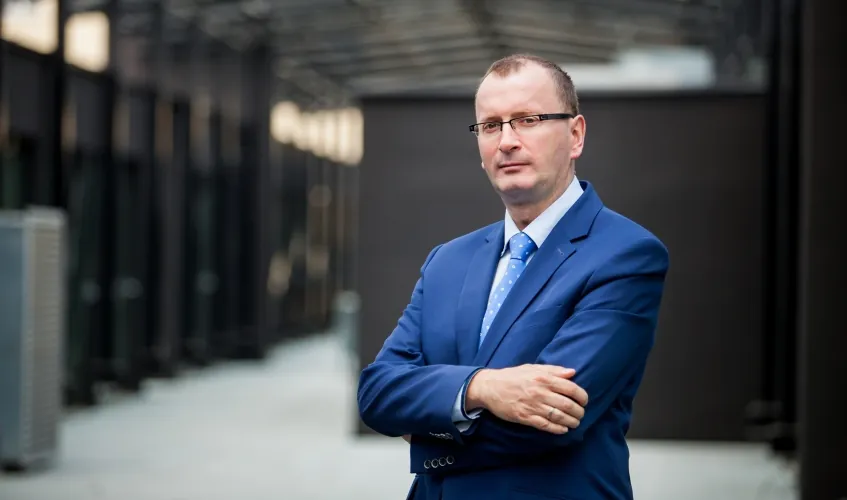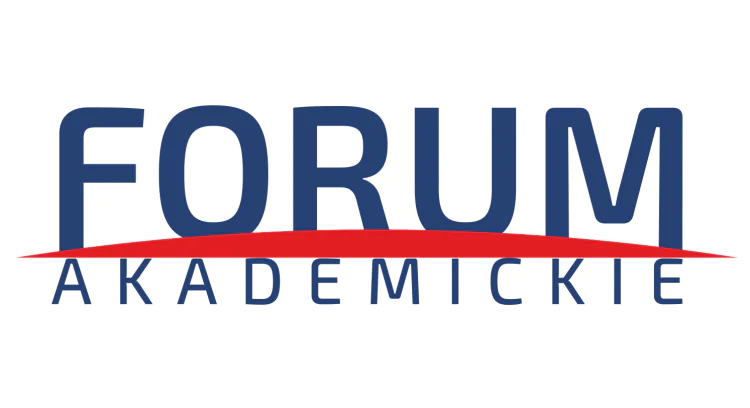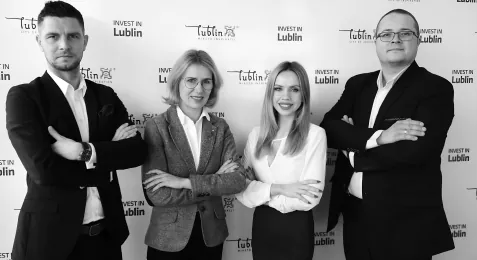Lublin Info Centre
Strategic internationalisation

An interview with Mariusz Sagan, PhD, the lecturer at Warsaw School of Economics and the Head of Strategy and Investor Relations Department in the City of Lublin, responsible for a strategy, economic development and relations of the city authorities with higher education institutions.
Lublin has the highest degree of universities’ internationalisation…
Yes, it is calculated on the basis of the proportion of international students to the student population in general.
…there is also the prevalence of Ukrainian students among students from many other countries. Lublin can be perceived as a reflection of what is happening regarding internationalisation of higher education in Poland.
It seems true. Internationalisation of both education itself and higher education is the most significant for Lublin. These two fields constitute 18% of the income generated by the city, which equals to tens of thousands people working for universities, and 10 thousand people in the very higher education institutions. This is the question of innovative development: universities have to provide innovation, and they can do it, e.g. by reforming research and education, opening them up to the outside world and internationalisation. Only then will they constitute the innovative development engine of the city and the region.
So to what extent do the international students, who come and go, contribute to it?
This is true that most of them leave the country after graduation. This is how it works all over the world. However, it is a matter of specific more sophisticated mechanism: universities must be provided with a different impetus for change. The most important are the systemic ones: law, finances, but impetus in our surroundings play a crucial role as well – from the city or a local business. We have decided that an impetus from the city would be comprehensive in Lublin. We have incorporated academic education into the development strategy of Lublin, although formally the city has nothing to do with higher education or science.
Local government is not able to provide direct financial support to the universities.
However, we can have an indirect impact on them, e.g. by promoting a strong emphasis on academic education of the city and, therefore, of the universities which function within it. Incorporating academic education into the development strategy, we have decided to make it one of the four main pillars of the city development and internationalisation will stimulate changes in the structure of higher education institutions. It is happening today.
In what sense?
Simply, we have in mind students from Ukraine and those studying in Polish – as far as new students in the face of a demographic decline in our country are concerned. However, we think of more ambitious operations, which means attracting students studying in English and those who pay for studies as well as commercial financial resources for universities which affect students. What effect does it produce? On the one hand, an impetus for the staff development, a change of its mindset and acquiring new competencies, not only language competences but also the ability to lead courses in multicultural groups. Then a part of the academic staff draws on these competencies to develop its interests and publications as well as establish contacts with academic institutions. On the other hand, it is an impetus for the change of the university structure. In order to be competitive in a global education market and to effectively attract international students, it is necessary to have competitive administrative structures. At a university, these issues come together, blend and transform.
I have the impression that an international student does not confront our university administration until the start of studies. Firstly, international students face the academic staff and the products of promotion departments, not the administration.
It might have a positive impact. On the one hand, attracting an international student results from the activity of departments of international cooperation, but also recruiters – foreign colleagues of Polish universities who work in particular countries. When it comes to Lublin, there is both university and city promotion. Another thing that must be borne in mind is the ministry which financially supports our undertakings, e.g. the participation in international educational fairs, and thus provides the tools for an effective promotion. We also have the Perspektywy Education Foundation which supports us in such activities. Combining all these possibilities brings success. The contribution of ministry is indispensable, but we make available not only people and ideas but also money. We pay one thousand dollars to participate in the NAFSA conference in Philadelphia, and apart from that, we must finance secondments of workers. The city intentionally invests in this venture. Synergies between the activities of several entities lead to success. The effects of these actions are already noticeable.
There is also know-how. It is necessary to know what move to make in this complicated and differentiated world. Do we have the joint know-how or everyone has its own one which is adequately protected against the competition?
We have a common objective: bring to Poland as many international students as possible. But each university wants to have them; therefore they compete with each other, at the municipal level as well, which is exemplified by similar fields of study arranged. The fact that an academic staff moves from one university to the other has been until recently the nightmare of universities in Lublin. It seems that it has changed recently. When it comes to know-how, it is a joint capacity and expertise building. At the beginning there was the Catholic University of Lublin (abbr. KUL)and Academy of Music, today there is the Medical University of Lublin.
The Catholic University of Lublin?
Yes. In the 1980s it was KUL that had an internationalised academic staff, frequently going abroad, which other Polish universities did not have. International contacts ensured it a strong position. KUL was influential in the East thanks to the John Paul II Foundation. Now it comes back to its glory. The Medical University of Lublin began strengthening its position over twenty years ago – in 1995 it introduced English-language programme. Thus, we have been developing our competences for a long time. This is the matter of competence development of the university authorities, student services in foreign language, students having different habits. It is crucial to know at least how to manage money at the international level. It is necessary to know insurance issues. We have almost fulfilled this task. Maria Curie-Sklodowska University (abbr. UMCS) serves here as an example of considerable success. Although this concerns mainly students from Ukraine, an active promotion and service scheme for those people was created there. Public universities in Lublin, maybe except for the University of Life Sciences in Lublin which reviewed these issues only a few years ago, and private universities have already acquired the knowledge. This includes institutions which got more profound insights into these issues sometime later, in 2011, when we implemented an urban project Study in Lublin. Then the Medical University of Lublin has already attracted a stable number of one thousand international students. The urban project provided the impetus for creating support systems, increasing the number of students and comprehensive integration measures.
How do you perceive it concerning the distinction between public and private universities?
Initially, private universities just tried to protect themselves against demographic decline, counting on a student from Ukraine, and when they noticed that it functioned well, they decided to rely on English-language fields of study and students from all over the world, e.g. from Asia. The University of Economics and Innovation in Lublin was good at projects which increase scientific and teaching competence. They acquired competence in the implementation of such projects. Currently, these abilities are used to create English-language studies. On the other hand, Vincent Pol University has been creating English-language fields of study for years by attracting students from Asia and Africa. Each university has its own model. The three universities, including also the University College of Enterprise and Administration in Lublin, quickly introduced reforms, directed internationally and now achieve success. It was a matter of three, five years. The Higher School of Social Sciences is a separate issue. The public universities needed more time. However, those which have taken measures to internationalise studies, make considerable progress now.
Are there differences between public and private school strategies?
The city cooperates with all Lublin universities in the area of promotion, integration, co-financing of events and conferences. We strive to motivate them to create English language majors. A few years ago there were eight of them, and today there are nearly fifty. This is the measure of our mutual success. It has taken us time to motivate private universities to implement English-language programmes and to cooperate with the city, but once the decision was made, the actions were quick and the effects came quickly. Public universities have understood the importance of internationalisation more quickly.
However, the eastern direction of expansion dominates.
We have 48% of students from Ukraine, which means a lower proportion than all over Poland. It is not a coincidence. Several years ago we decided to reorient the geography of our expansion on the international markets. We started to rely on the Central Asian market: Kazakhstan, Uzbekistan and Caucasus: e.g. Azerbaijan, Georgia, Turkey as well as African market. We wanted to enter these markets as soon as possible in order to emerge there as the first from Poland
To what extent does the Medical University of Lublin influence the geographic diversity of the origin of international students in Lublin?
Some time ago it was a dominant influence, and now it is a less substantial impact. However, there are not many students from Ukraine. Now in Lublin, there are students from about one hundred countries, and this diversity is maintained thanks to all the universities. Vincent Pol University hosts students from over forty countries. The balance is sustained, and we have to continue along these lines.
Which areas of integration of international students can be supported by the city and which remain in charge of universities?
The city has a say in the issue of academic environment resources, e.g. the life quality (and this is crucial for students), cultural and sports offer, green space. The second group of issues is the security – the cooperation with the police is of primary importance here.
Does Lublin rank low in terms of the security?
It is not that bad, but in comparison to 2012-13, the situation has deteriorated all over Poland. In Lublin, there are not many incidents as in other cities, and we do not focus on hyping them up. First problems appeared when a large group of students from Ukraine arrived in Poland after the crisis in their country. Then there was a matter of refugees. However, the situation has improved recently.
Do we have problems with aggression towards students from Turkey?
There have been such cases; fortunately, it happened rarely in Lublin. Currently, the situation is better. What is crucial here is the reaction of the city authorities, universities, the police, friends. Turkey seems expansionary, and we are present in that market by participation in the Istanbul and Ankara educational fairs. We insist on attracting students from Turkey.
You have started with the economy, benefits for the city, and what are the economic benefits from internationalisation for the universities?
We estimate that the fee income from international students at the universities in Lublin will amount to about PLN 400 million over the period 2017-20.
And currently?
It is about 70-80 million zloty annually. Additionally, about PLN 50 million is allocated to the variety of services connected with living in Lublin.
So international students spend in Lublin 120-130 million per year?
Yes, and now there are 6.5 thousand of them. Cultural integration takes place during the cultural events, but we still have a lot to do t0 involve foreigners in the real student culture, e.g. theatres, music bands. It is being performed at the municipal level, not only at university level although we are not provided with tools involving students in urban culture.
What kind of tool could it be?
E.g. information, a platform for international students which makes it possible to keep current with cultural activities in the city. The Centre for the Meeting of Cultures attempts to create the programme of cultural integration. For the time being it purchases and sells the products of culture, but the programme of an active integration is planned to be created for international students as well. NGOs play a significant role in incorporating international students into the culture and voluntary service. We would like to create some co-working space and incubators to make it easier for them to enter the urban environment. They are slowly becoming part of the culture, although sport still remains underexploited in this regard. If international students in Lublin play football or cricket, like Hindus, they do it in public urban spaces but play among themselves. They did not dare compete with Polish students. Neither Poles engaged them to play, nor they invited Poles to take up their sports disciplines. Still, it is not connected to one another. International students discover our sports venues, find a way to use them, and it is easy to meet them at stadiums in the area of the school, athletics tracks. It is a challenge for the city – cultural and sports fields. It is not just a matter of their usage cultural and sports facilities, but their activity in these areas, which would be interesting and beneficial also for the citizens of Lublin. When it comes to the economy, we strive to provide international students with internships and on-the-job training in Polish companies. We are preparing companies to undertake such initiatives. It is a matter of the language, a mental one. It is all in the initial phase of operation, but what is important here is that we have started getting things moving.
What about public transport?
It seems that it is getting better and more ecological. We already have a quite good cycling infrastructure, though not finished yet, and a bicycle renting system…
There is no evidence that international students use them quite intensively.
The reason for that might be the fact that they search for flats near the university, so they do not need a bicycle. Many years ago it was they who initiated a trend for running.
During the conference on integration of international students, I was astonished by the fact that a girl from Zimbabwe wanted to take the more active interest in the lives of student organisations, and more precisely self-government of UMCS which probably did not open up such an opportunity. International students are no longer exhibits. Instead, they want to contribute to creating a new reality that they have chosen for the next most crucial years of their lives.
This fact demonstrates that full integration is a very complex, multifaceted process. We have in mind large organisms – both urban and academic – and the growing number of people.
I have the impression that for an international student the situation in Poland is markedly different from that in Great Britain.
Of course. There on the streets, they hear and can effectively communicate using the language in which they study. The situation is different in Poland, although there is a growing tendency to have a good command of English. Our institutions are not properly prepared, whereas the British ones are used to cooperation with foreigners. They are engaged in cooperation by the institutions there, and we do not develop such initiatives. We have to decide whether it is better to let go and expect that everything will sort itself out – it turns out that it is not always effective – or to attempt to control this process. It seems that the role of the city is to help the universities and institutions to create a cooperation system with foreigners. If we offer foreigners opportunities, they will grasp them.
So it is visible – among students taking part in the Erasmus programme as well – that international students integrate with themselves and not with Polish students.
It is true. What is more, groups of students from different countries compete with each other, e.g. students from Uzbekistan and Kazakhstan.
What does it mean? How do they compete?
They compete for learning achievements, grades, recognition. It motivates them. These are the mechanisms which emerge in groups. Students who come to us from the East, perceive their stay in Poland as a chance of their lives and strive to make the most of their stay here.
During the conference, I have talked to students from Ukraine. They all worked in Poland.
That is an excellent sign. It is a factor which attracts them to Poland. Five years ago it was not that easy and sometimes even impossible. For the time being, they are provided with simple jobs: logistics, trade, gastronomy, but we also want to offer them access to the real labour market, to more decent jobs. There are many challenges, and here the question is whether universities are on their own or if this process should be supported by the city or other organisations, e.g. the ministry. Here the city can do great things. We want Lublin to leave an excellent impression on them. On this market one of the critical factors in the selection of a particular country, city, the university is an opinion of friends or family members who have already studied here. Whisper marketing is crucial in this case. They must be given a clear message concerning the quality of life, studying, culture. Moral of the story is as follows: The city must be the leader in the process of internationalisation because it is the whole system: universities, culture, sport, work, recreation, the quality of life, the sense of security and real security.
What are the next steps to be made for the city in this area?
Our goal is to attract 15% of foreigners to Lublin by 2025, having a stable number of students simultaneously so in proportion to the number of people who currently study at our universities.
The latter might be difficult in the period of demographic decline and taking the best secondary school graduates by big academic centres.
The situation is not that bad. The most significant fall in the number of students is noticeable in Łódź and Katowice. In Lublin, the fall in the last six years amounts to 13%. In other cities in eastern Poland, there are greater decreases: Rzeszów – 19%, Białystok – 27%, Kielce – 36%, Radom – 33%. The number of students in smaller cities is dramatically declining: Zamość – 66%, Chełm – 40%, Krosno – 40%. However, Puławy and Dęblin have increased the number of students. We are well informed because we conduct such research themselves – 79% of people who graduated from secondary schools in Lublin decide to study in Lublin. Other cities are chosen by about 18%, and 2% goes abroad. 11% of secondary school graduates from Lublin opt for Warsaw.
That is a lot.
Some time ago the percentage was 25%, and almost half of the graduates moved from Lublin.
Why did it change?
Numerous factors influence it: the quality of life, access to the labour market and flats, culture, communication as well as educational offer. We feel that living conditions have significantly improved. I assume that we still have twelve years of above-standard work so that Lublin could develop a metropolitan potential comparable to Poznań or the Tricity. Coming back to secondary school graduates: Kraków attracts 3% of graduates from Lublin, Wrocław 2% and Poznań 1% of them. Universities in Poland regionalise – I mean the fact that they mostly attract students from the nearby area. The distance gains in significance. A similar situation exists in Warsaw where more and more students are the residents of the Mazowieckie Voivodeship.
Are you then not concerned about the further situation of universities in Lublin in terms of students’ recruitment?
No. We have the data for 2017 – this is the first time in eight years that the number of students remained unchanged compared to the previous year. Stabilization emerges, which in this case is quite favourable. We are doing a lot to encourage secondary school graduates from the region to study in Lublin. The second significant point concerns integration. The third one relates to increasing the number of English-language programmes at universities in Lublin. Currently, there are 50 of them, and we would like to create about one hundred such programmes. It requires a deep reflection – which programmes and fields of study are worth opening up in English. It is not just a matter of the selection of subjects itself, a division into lectures, classes, laboratory classes, seminars and finding an appropriate academic staff, but also the promotion of these fields abroad. The fourth challenge is economy – without a healthy economy, it is impossible to attract international students. We are doing a lot in Lublin for industrial reconstruction, the development of our regional specialisations in the economy and there is evidence that the results of such activity are reflected in the internationalisation of education or at least are positively correlated with it.
Interviewer: Piotr Kieraciński






